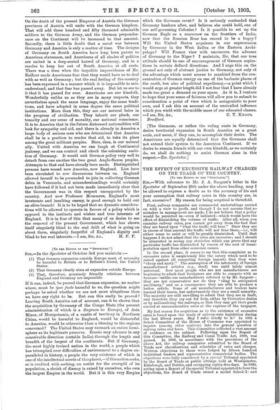THE EFFECT OF EXCESSIVE RAILWAY CHARGES ON THE TRADE OF
THE COUNTRY.
[To THE EDITOR OP THE "SPECTATOR."] SIE.,—With reference to Mr. J. A. Sargent's letter in the Spectator of September 26th under the above beading, may I be allowed to express a doubt as to the accuracy of his and your assumption that railway rates in this country are, in fact, excessive? My reason for being sceptical is threefold.
First, railway companies are commercial undertakings carried on with a view to profit, and though I do not assume that no mistakes in management are made, I do not believe that a policy would be persisted in—even if initiated—which would have the effect of diminishing the volume of traffic. After all, when you examine railway rates, you cannot get away from the fact that they are based upon "what the traffic will bear." Once they are in excess of that amount the traffic will not bear them,—Ce., will either cease to exist or will be greatly diminished. Until that happens I do not admit that the rates are excessive; and I should be interested in seeing any statistics which can prove that any particular traffic has diminished by reason of the cost of trans- portation apart from other economic causes.
In the second place, it seems to me that this complaint as to excessive rates is suspiciously like the outcry which used to be raised against all competing foreign imports that they were "cheap and nasty." The assumption of the inferiority of foreign manufactured articles (e.g., steel) was until lately almost universal. Now most people who are not manufacturers are beginning to admit that foreigners are able to compete with us because—unlike our manufacturers referred to by Mr. Sargent— they are not conservative nor do they " cling to antiquated machinery," and as a consequence they are able to produce a better article. Some of our manufacturers and traders have learned their lesson, but unfortunately they are a small minority. The majority are still unwilling to admit that they are in fault, and therefore they cry out for help, either by Protective duties or by nationalising the railways, so that they may get their goods carried at unremunerative rates at the expense of the taxpayer.
My last reason for scepticism as to the existence of excessive rates is based upon the study of railway-rate legislation during the last fifteen years. May I refer briefly to it? In 1881 a Select Committee of the House of Commons was appointed to inquire (among other matters) into the general question of railway rates and fares. This Committee collected a vast amount of evidence on the subject. Following upon the Report of this Committee, the Railway and Canal Traffic Act, 1888, was passed. In 1889, in accordance with the provisions of the above Act, the railway companies submitted to the Board of Trade new classifications and schedules of rates and charges. Written objections to these were lodged by fifteen hundred individual traders and representative commercial bodies. The objections were fully considered by a special Tribunal appointed by the Board of Trade at public sittings held at Westminster, Edinburgh, and Dublin, and occupying eighty-five days. In 1890, acting upon a Report of the special Tribunal appointed to hear the objections, the Board of Trade issued a model Schedr 13 and Classification. This revised Schedule of rates and charges was embodied in provisional orders. In 1891 Bills confirming these provisional orders were introduced into Parliament. Petitions were lodged both by the railway companies and by traders against these Bills, which were referred to a Joint Committee of both Houses, and after a prolonged inquiry were passed with certain modifications. On January 1st, 1893, the revised Schedule came into force. But Parliament was not satisfied. Having, after the most careful inquiry, produced a Schedule of rates and charges which it considered equitable, it proceeded to enact by the Railway and Canal Traffic Act, 1894, that any trader aggrieved by any increased rate imposed since 1892— although that increased rate would be within the inacitna allowed 'by the Schedule of 1893—could compel the railway company to prove before the Railway Commissioners that the increase was Justified. The effect of this later Act is, in practice, to restrict 'the power of the railway companies to charge rates up to the 'maxima allowed by the Schedule of 1893.
I have gone somewhat into detail as to the steps by which Parliament has fixed and regulated the present schedule of rail- way rates in order to show how carefully the subject has been inquired into and considered, what ample opportunities have been given to traders to put their case forward and to criticise the railway proposals, and how fully the traders—with the assistance of the ablest counsel at the Bar—have taken advantage of their opportunities. In all these circumstances, I venture to think that if any assumption is to be made, it should be that—unless circumstances to-day are very different from what they were in 1893 —railway rates are not excessive, and are fair and reasonable.
[We can publish no more letters on this subject.—En. 'Spectator.]















































 Previous page
Previous page